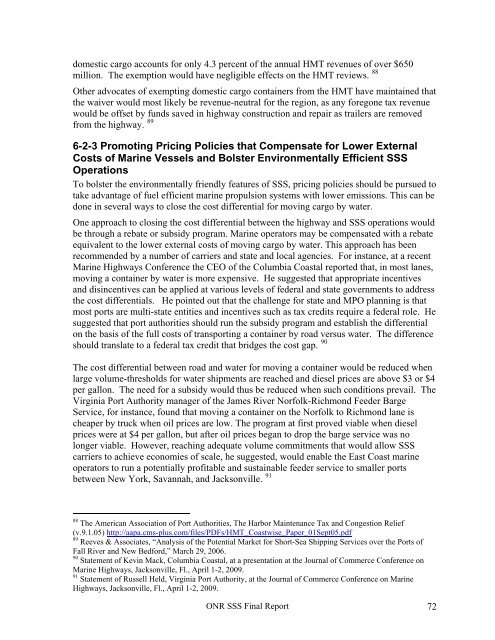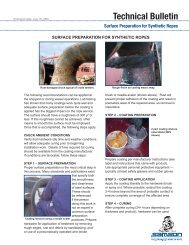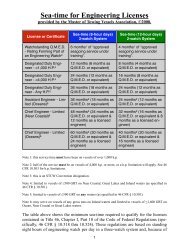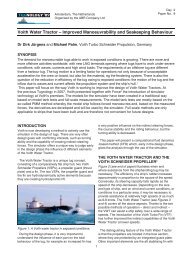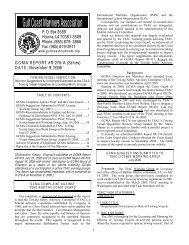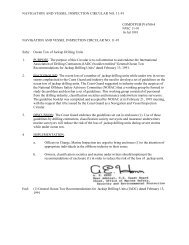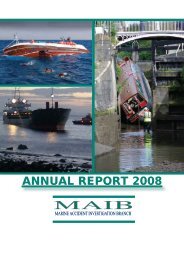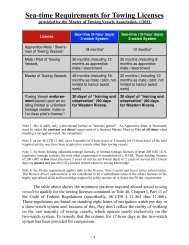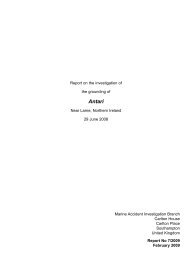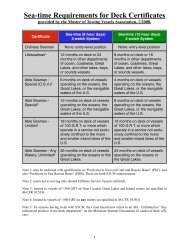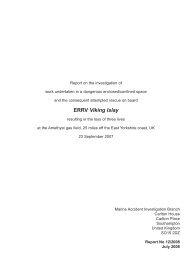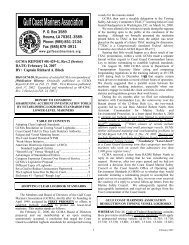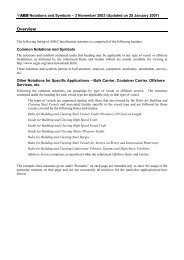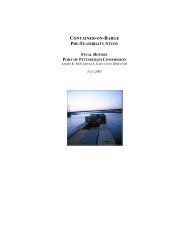Office of Naval Research - National Transportation Library
Office of Naval Research - National Transportation Library
Office of Naval Research - National Transportation Library
Create successful ePaper yourself
Turn your PDF publications into a flip-book with our unique Google optimized e-Paper software.
domestic cargo accounts for only 4.3 percent <strong>of</strong> the annual HMT revenues <strong>of</strong> over $650million. The exemption would have negligible effects on the HMT reviews. 88Other advocates <strong>of</strong> exempting domestic cargo containers from the HMT have maintained thatthe waiver would most likely be revenue-neutral for the region, as any foregone tax revenuewould be <strong>of</strong>fset by funds saved in highway construction and repair as trailers are removedfrom the highway. 896-2-3 Promoting Pricing Policies that Compensate for Lower ExternalCosts <strong>of</strong> Marine Vessels and Bolster Environmentally Efficient SSSOperationsTo bolster the environmentally friendly features <strong>of</strong> SSS, pricing policies should be pursued totake advantage <strong>of</strong> fuel efficient marine propulsion systems with lower emissions. This can bedone in several ways to close the cost differential for moving cargo by water.One approach to closing the cost differential between the highway and SSS operations wouldbe through a rebate or subsidy program. Marine operators may be compensated with a rebateequivalent to the lower external costs <strong>of</strong> moving cargo by water. This approach has beenrecommended by a number <strong>of</strong> carriers and state and local agencies. For instance, at a recentMarine Highways Conference the CEO <strong>of</strong> the Columbia Coastal reported that, in most lanes,moving a container by water is more expensive. He suggested that appropriate incentivesand disincentives can be applied at various levels <strong>of</strong> federal and state governments to addressthe cost differentials. He pointed out that the challenge for state and MPO planning is thatmost ports are multi-state entities and incentives such as tax credits require a federal role. Hesuggested that port authorities should run the subsidy program and establish the differentialon the basis <strong>of</strong> the full costs <strong>of</strong> transporting a container by road versus water. The differenceshould translate to a federal tax credit that bridges the cost gap. 90The cost differential between road and water for moving a container would be reduced whenlarge volume-thresholds for water shipments are reached and diesel prices are above $3 or $4per gallon. The need for a subsidy would thus be reduced when such conditions prevail. TheVirginia Port Authority manager <strong>of</strong> the James River Norfolk-Richmond Feeder BargeService, for instance, found that moving a container on the Norfolk to Richmond lane ischeaper by truck when oil prices are low. The program at first proved viable when dieselprices were at $4 per gallon, but after oil prices began to drop the barge service was nolonger viable. However, reaching adequate volume commitments that would allow SSScarriers to achieve economies <strong>of</strong> scale, he suggested, would enable the East Coast marineoperators to run a potentially pr<strong>of</strong>itable and sustainable feeder service to smaller portsbetween New York, Savannah, and Jacksonville. 9188 The American Association <strong>of</strong> Port Authorities, The Harbor Maintenance Tax and Congestion Relief(v.9.1.05) http://aapa.cms-plus.com/files/PDFs/HMT_Coastwise_Paper_01Sept05.pdf89 Reeves & Associates, “Analysis <strong>of</strong> the Potential Market for Short-Sea Shipping Services over the Ports <strong>of</strong>Fall River and New Bedford,” March 29, 2006.90 Statement <strong>of</strong> Kevin Mack, Columbia Coastal, at a presentation at the Journal <strong>of</strong> Commerce Conference onMarine Highways, Jacksonville, Fl., April 1-2, 2009.91 Statement <strong>of</strong> Russell Held, Virginia Port Authority, at the Journal <strong>of</strong> Commerce Conference on MarineHighways, Jacksonville, Fl., April 1-2, 2009.ONR SSS Final Report 72


